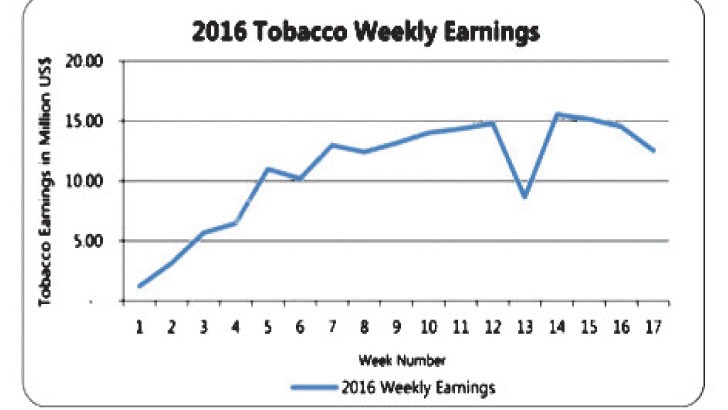Explore new markets for tobacco—FUM
Farmers Union of Malawi (FUM) has faulted the Tobacco Control Commission (TCC) for the continued reduced demand of the country’s main foreign exchange earner, tobacco.
The concerns from FUM come amid yet another poor tobacco marketing season partly blamed on falling demand for the green gold.
This year, buyers’ demand for the leaf was pegged at 171.1 million kilogrammes (kg), down from last year’s 178.2 kg.
In an interview on Wednesday, FUM president Alfred Kapichira-Banda expressed displeasure at low demand that has led to poor prices.
He emphasises the need for authorities to start looking for other markets of the leaf so that the Malawian grower can have hope in the sector which is one of the highest employers.
Said Kapichira-Banda: “As farmers, we are very disappointed that tobacco buyers continue to reduce their demand with each passing year. Considering also that vendors take advantage of us and find their way into the system, 151.1 million kg will not help us at all.
We need to go back to the previous years when officials from TCC, Tobacco Association of Malawi (Tama), Ministry of Agriculture, Irrigation and Water Development, and Ministry of Industry, Trade and Tourism would go outside the country in search of buyers and when they came back, they bring in one or two buyers,” he said.
Kapichira-Banda said that rather than waiting for buyers to pledge, TCC should take charge of finding markets for the farmers.
According to Auction Holdings Limited weekly market update, average prices for burley after week 17 of sales are at $1.41 (about K1 006) while average prices for flue cure stand at $2.58 (about K1 842).
Buyer apathy also continues to dog the auction system as high rejection rate of leaf was recorded at auction floors nationwide last week.
The injustice of the tobacco system is not a new phenomenon.
Former president the late Bingu wa Mutharika, an economist, in 2006 and 2007, tried to fix the problem by piling pressure on buyers to offer better prices to the growers or risk being thrown out of the country.
“Poor smallholder farmers in Malawi have remained poor because they are cheated by an international cartel that connives to buy our tobacco at exploitative prices, and yet they sell the same tobacco at huge profits in their countries,” he said. “If you dare to threaten me,” Mutharika continued, referring to middlemen, “some of you will find yourselves in handcuffs.”
After that warning, prices began to improve at the auction floors to reached S$1 per kg at auction, which is the estimated cost of production.
Then, when the auction opened in spring 2008, tobacco prices soared above $2, due in part to competition from a new government-run leaf-buying company.
However, the move backfired and since then, prices have been plummeting as production of the leaf continued to go up.
Some buyers say the prices are lower because of the poor quality of tobacco produced while TCC has maintained that the pricing of the green gold is driven by market forces of demand and supply.
However, Civil Society Agriculture Network (CisaNet) executive director Tamani Nkhono-Mvula believes growers should focus on producing high quality tobacco rather than producing large quantities of poor quality.
He said production of high quality leaf would help Malawi tobacco fetch more prices.
“While it is evident that the reduced tonnage may affect revenues realised from tobacco sales, producing quality tobacco may be key to offsetting such threats.
“What we need to do now is encourage farmers to bring the best tobacco. Again, maybe it is high time we engage more buyers on the tobacco market,” he said.
Apart from being the main foreign exchange earner, available figures show that tobacco contributes about 13 percent to gross domestic product (GDP) and 25 percent to the tax revenue.
Since the marketing season opened early April this year, Malawi has sold 118 million kgs of tobacco to earn $185.7 million (K132 billion). n






